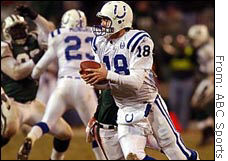
NEW YORK (CNN/Money) - Most broadcasters and advertisers fear TiVo.
Sports leagues and team owners think it will be their salvation.
TiVo, like other digital video recorders, allows people to watch a program while recording it, pausing the show at some points, replaying some portions, then speeding past commercials or other unwanted moments. It also allows for easier recording and storage of shows than a VCR.
DVRs were estimated to be in only 7 million U.S. homes, or just under 7 percent, at the end of this year. That is slightly more than double the number of homes that had them only a year ago.
According to the research firm the Yankee Group, DVRs are forecast to reach almost a third of homes as soon as 2008.
That growth scares advertisers and networks are fearful that even fewer viewers will be exposed to the commercials used to pay the bills in the future. They have good reason to worry -- TiVo estimates that its customers watch only 53 percent of commercials on sitcoms.
No delays of game?
Unlike their entertainment brethren, those in the world of sports believe they have a relatively TiVo-proof form of programming. That's because sports fans aren't going to record tonight's game to watch tomorrow, they way they would episodic television.
 |
|
| Monday Night Football is watched live or near live by about 92 percent of TiVo users, far more often than they watch sitcoms live. |
In fact, as personal DVRs become more and more common, sporting events will become one of the only things that most people watch live. And that makes sports execs hopeful that despite declining ratings, the live-action distinction gives them leverage in negotiating rights fees.
Kimber Sterling, director of advertising and research for TiVo say that the programs least recorded for later viewing by its customers are sports.
In one TiVo study, fewer than 10 percent of customers who watch Monday Night Football are watching a recording. Another study found only 15 to 20 percent who watched the Olympics in prime time recorded it, even though many of the competitions shown were on tape delay from Athens.
By comparison, only about 40 percent of those watching sitcoms using TiVo are watching it live or nearly live. Even reality shows -- the least recorded entertainment programing -- had only 51 percent watching it live.
| SportsBiz
|

|
| Click here for SI.com sports coverage
|
|
|
|
"It's a good time to be in sports programming," said Sterling. "Some of the deals will be up for renewal in the coming few years will be more valuable than they are today."
But there are soft spots in these assumption.
First of all, even many of the TiVo users watching at game "live" on TiVo are up to 30 minutes behind the real-time broadcast, a fact that allows viewers to skip ahead when they get to commercials or dead points in the game.
Sterling also admits that Monday Night Football may be a special case compared to more mundane sporting event, such as a Tuesday night baseball game in June.
Games like that probably make more sense to watch on that "near-live" basis, which allows you to cut out commercials, and all the dead time between plays.
TiVo hasn't done a study yet into what percentage of TiVo users watching an early-season Yankee-Devil Rays game started viewing it a couple of hours late so they could cut it down to the 45 minutes of time it probably deserves.
As viewers become more comfortable with DVRs and their capability, this kind of semi-live viewing could become a lot more common.
It's also questionable whether 47 percent of TiVo viewers who avoid commercials during sitcoms would be any more valuable when they're watching sports.
"The principal thrust of advertising is reaching a specific audience," said Neal Pilson, sports broadcasting consultant. "A sports audience is not necessarily a 'Friends' audience."
Pilson said that despite all the hopes for DVR growth and a competitive advantage for sports programming over entertainment, he has yet to hear the issue raised in any contract negotiations. That includes the 2010 and 2012 Olympic deals he helped reach last year and the Rose Bowl contract he just helped to conclude.
"Penetration remains small," he said. "I just don't think it's a factor right now in an advertiser's decision whether to buy sports. It may become a factor, but I think it'll be a long time."

|

